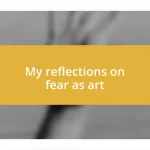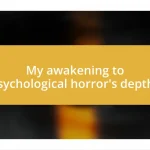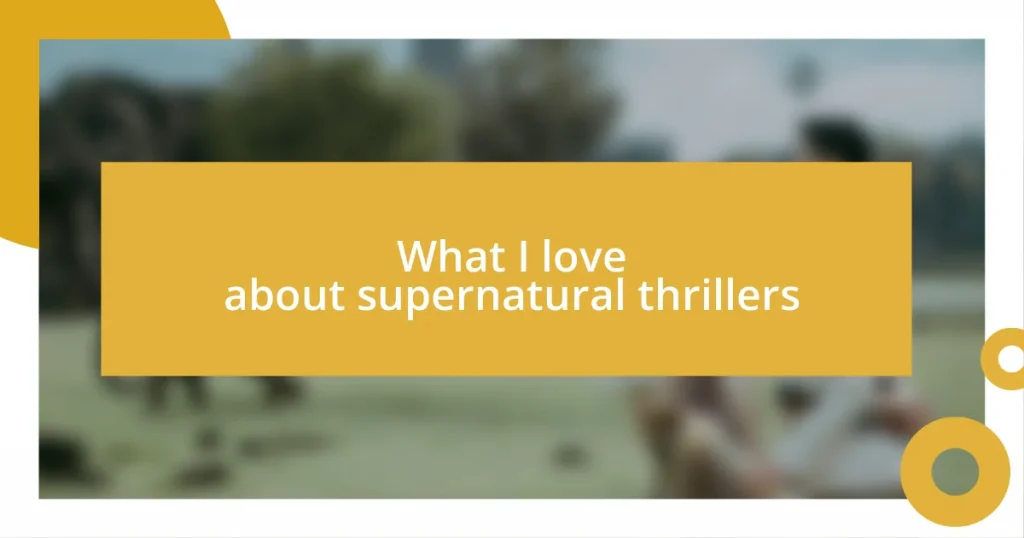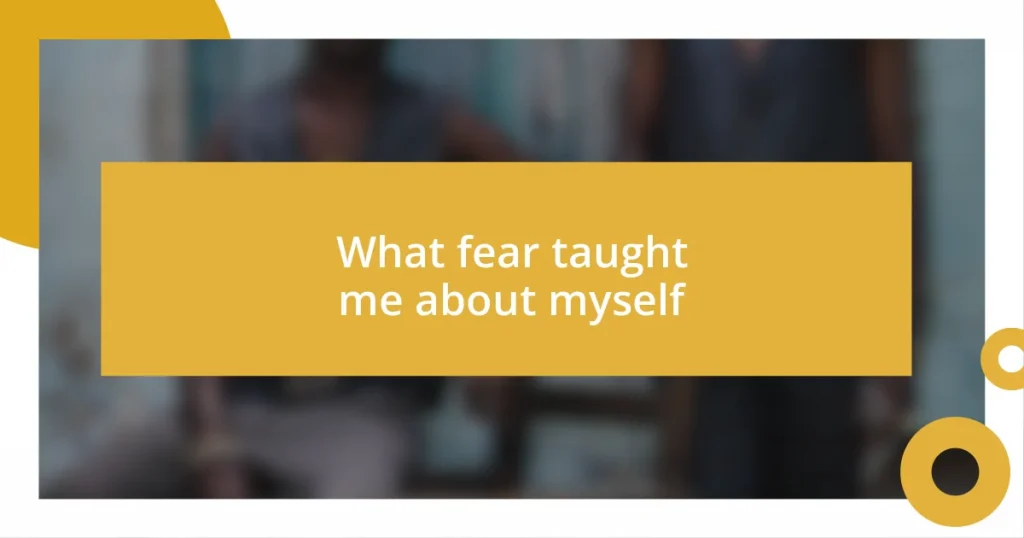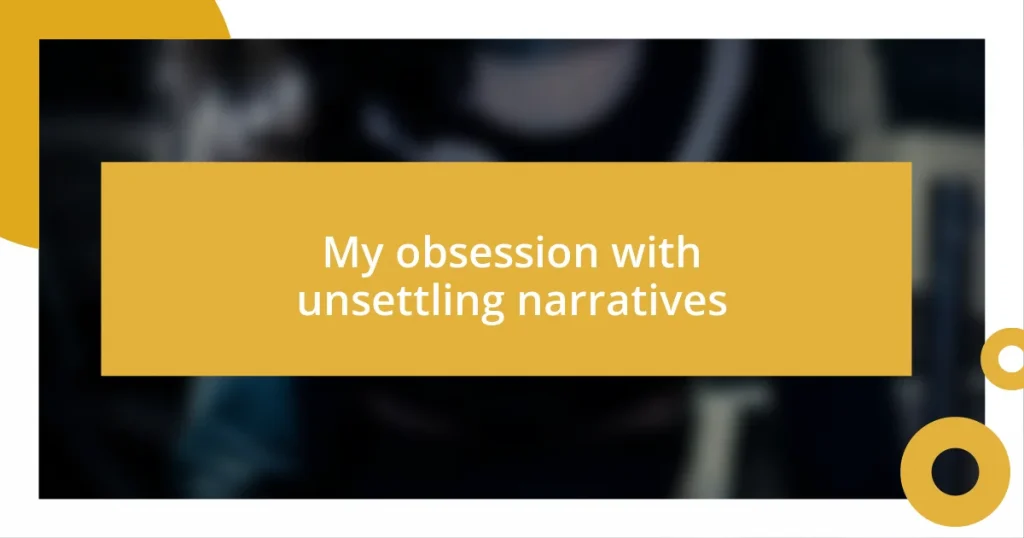Key takeaways:
- Supernatural thrillers effectively blend suspense and the paranormal, evoking deep emotional responses and reflecting personal fears through character struggles.
- Key elements of the genre include paranormal phenomena, psychological depth, unreliable narrators, and moral ambiguity, each enhancing the reader’s experience and engagement with the narrative.
- Prominent themes such as fear exploration, isolation, and confrontation with the unknown deepen the impact of these stories, while analyzing character development and symbolism enriches understanding of the genre.
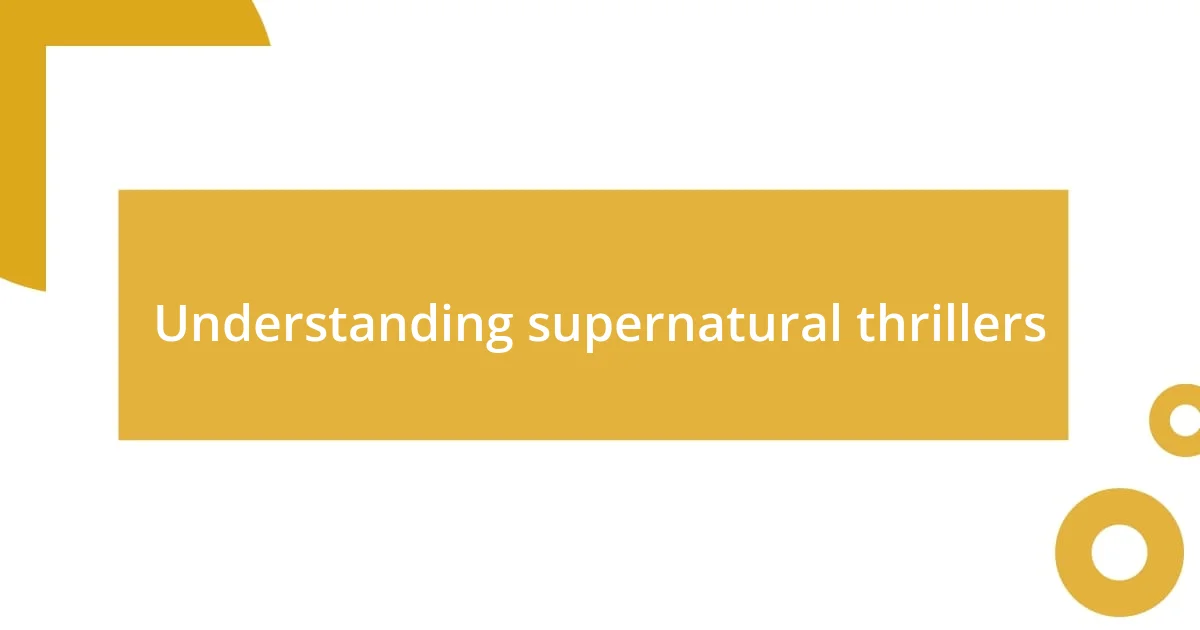
Understanding supernatural thrillers
Supernatural thrillers blend elements of suspense with the paranormal, creating a unique genre that captivates the imagination. There’s something thrilling about the idea that there may be forces beyond our understanding at play, wouldn’t you agree? When I pick up a book or watch a film in this genre, I feel a rush of anticipation, looking forward to what uncanny twist awaits around the corner.
One aspect I find particularly fascinating is the emotional resonance these stories can evoke. For instance, I remember reading “The Shining” and feeling an ice-cold dread that crept up my spine with every page. The tension isn’t just built on the supernatural elements; it also hinges on the characters’ psychological struggles. I often ask myself: how do these gripping narratives draw us in so deeply? It’s precisely because they mirror our own fears, amplifying them through the lens of the otherworldly.
Moreover, supernatural thrillers often challenge our perceptions of reality. Have you ever watched a movie that made you question what’s real? I remember one film that explored the thin line between sanity and madness, leaving me debating its implications long after it ended. These stories invite us to confront untamed fears, ultimately reflecting the chaos within our own lives, which is, in many ways, what makes them so compelling.
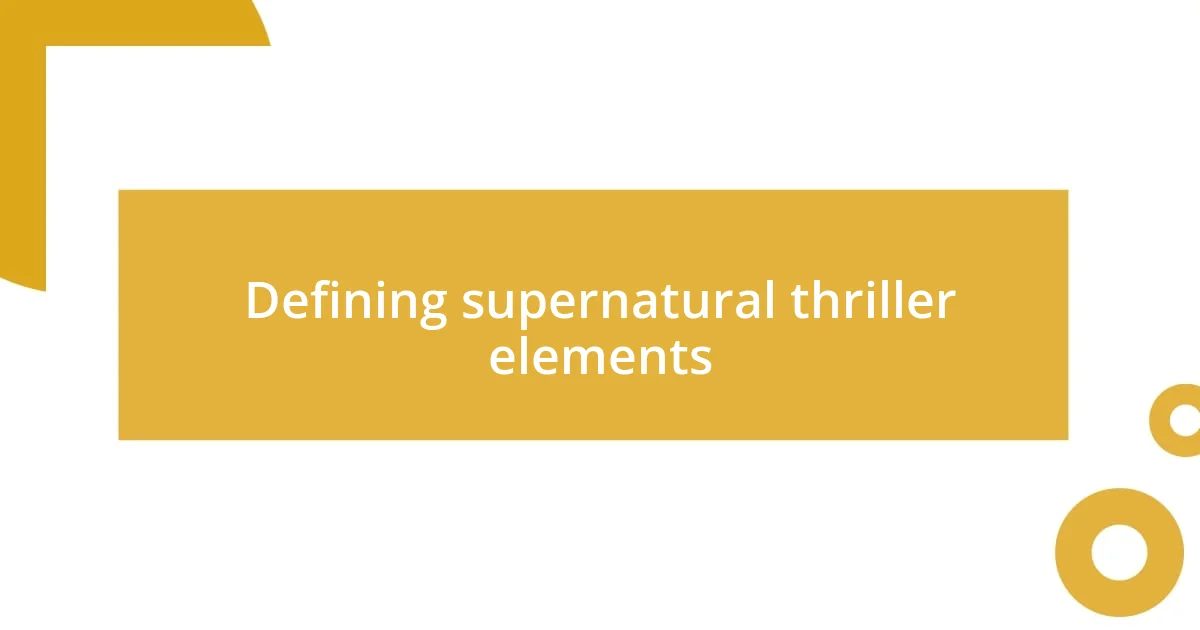
Defining supernatural thriller elements
When I think about the core elements of supernatural thrillers, a few standout features come to mind. The interplay of tension, mystery, and the inexplicable is what sets this genre apart. It’s an invitation to journey into the unknown, where nothing is guaranteed, and every shadow could hide something sinister. I recall reading “Bird Box,” where the unseen entities create relentless suspense. The fear of the unknown lingered long after I turned the last page, illustrating how these stories thrive on our imagination.
Here are some defining elements that I believe make supernatural thrillers so compelling:
- Paranormal Phenomena: Ghosts, demons, and otherworldly forces are often central, heightening the sense of danger.
- Psychological Depth: Characters grapple with mental struggles that resonate with their supernatural experiences.
- Unreliable Narrators: Twists and turns often come from characters questioning their reality or sanity.
- Atmospheric Settings: Locations like haunted houses or eerie landscapes evoke a palpable sense of dread.
- Moral Ambiguity: The blurred lines between good and evil force readers to confront their own beliefs about right and wrong.
Reflecting on these aspects makes me realize how supernatural thrillers transport us into worlds where fear is tangible yet thrilling. Each element masterfully intertwines, creating a tapestry of suspense that keeps us on the edge of our seats.

Key themes in supernatural thrillers
The exploration of fear is perhaps the most compelling theme in supernatural thrillers. I often find myself drawn to how these narratives encapsulate our deepest anxieties, presenting them in a way that’s both familiar and horrifying. For example, I vividly remember watching “Hereditary” and realizing it wasn’t just about supernatural elements but also the disintegration of family ties. The film brilliantly demonstrated how fear can stem from within, amplified by the eerie events unfolding on screen.
Another key theme is isolation, which many supernatural thrillers utilize effectively. The protagonists typically find themselves in settings that amplify their solitude, making them more susceptible to supernatural occurrences. I felt this intense disconnect while reading “The Cabin at the End of the World,” where the characters’ growing sense of paranoia, trapped in a remote location, made their plight increasingly relatable. It’s fascinating how this theme intensifies the stakes of the narrative, heightening both tension and empathy.
The confrontation with the unknown also plays a pivotal role in these narratives. There’s a certain thrill in exploring areas our minds deem unsafe or unpredictable. I remember thinking about this while reading “The Haunting of Hill House.” The house itself seemed to have a personality, a character of its own, conjuring my own fears about what might be lurking just out of sight. This theme compels readers to step beyond their comfort zones, pushing them to engage with something larger than life.
| Theme | Description |
|---|---|
| Exploration of Fear | Delves into personal anxieties, often manifesting in supernatural elements that mirror internal struggles. |
| Isolation | Characters find themselves in remote or confined settings, amplifying their vulnerability to paranormal experiences. |
| Confrontation with the Unknown | Encourages engagement with unsettling and unpredictable forces that challenge characters and the audience alike. |

Engaging characters in thrillers
Engaging characters are the heartbeat of supernatural thrillers, and I’ve always found myself drawn to their complexities. They often mirror our fears and vulnerabilities, making their journeys resonate on a deeper level. When I read “The Silent Patient,” I was captivated by the protagonist’s psychological turmoil—her silent struggle spoke to me in a way that felt both haunting and relatable. Doesn’t it make you question how just one traumatic event can alter the course of a life entirely?
What I cherish most is how these characters evolve through their supernatural encounters. They start as ordinary people, but the tension forces them to confront their darkest fears. I remember feeling a mix of dread and excitement as I followed the character in “The Shining”—each eerie encounter drew him farther from reality, leading to a transformation so profound it made me examine my own mental boundaries. Isn’t it exhilarating to witness this kind of growth, even amidst chaos?
Then there are those flawed characters who become our guides through the darkness. Their moral ambiguity adds layers to the narrative, often challenging our perceptions of good and evil. One character that stuck with me was in “The Sixth Sense,” whose own fears and regrets made his journey through the supernatural world all the more compelling. I found myself wondering, do we root for them despite their flaws? It’s this dichotomy that leaves us pondering way beyond the last page.

Creating suspense in storytelling
Creating suspense in storytelling often hinges on the delicate balance of tension and release. I remember reading “The Girl with All the Gifts,” where every quiet moment felt pregnant with potential danger. The author expertly layered small hints and foreshadowing, making me hyper-aware of every creak and sound, as if they were whispers from the unknown. Isn’t it intriguing how those subtle cues can create an atmosphere that lingers long after the page is turned?
One technique that I find particularly effective is the use of unreliable narrators. They draw you in with their perspective, but there’s always that nagging doubt—can you trust what they’re saying? I was captivated by the voice in “Shutter Island,” where the protagonist’s grip on reality falters, leading me down a rabbit hole of uncertainty. It makes me wonder, how much of our fear stems from the unpredictability of the very person guiding us through the story?
Lastly, the timing of revelations can make or break suspense. I vividly recall the moment in “The Sixth Sense” when the truth hits; it felt like a punch to the gut, reshaping my entire understanding of the narrative. The slow unraveling of the plot kept me on edge, constantly reevaluating everything I thought I knew. Doesn’t that kind of twist keep you up at night, replaying the story in your mind, piecing together all the clues?

Recommended supernatural thriller authors
There are several authors who have truly mastered the art of supernatural thrillers, each bringing their unique flair to the genre. One that stands out for me is Stephen King. His ability to weave the ordinary with the extraordinary never ceases to amaze me. I remember picking up “Pet Sematary” late at night, drawn in by its eerie premise. That book didn’t just thrill me; it left me pondering the nature of grief long after I turned the last page. Have you ever felt that a book changed your perspective on something fundamental?
Another author I can’t recommend enough is Tananarive Due. Her take on horror infused with cultural elements really resonates with me. “The Good House” combines family history with supernatural suspense, creating an atmosphere that’s both familiar and unsettling. I found myself so invested in the protagonist’s journey that it felt almost personal, as if I were uncovering my own fears along the way. Isn’t it fascinating how storytelling can dig into our own backgrounds and emotions?
Lastly, I have to mention Shirley Jackson; her grasp of psychological dread is unparalleled. Reading “The Haunting of Hill House” was like walking through a haunted house in my mind. Each character’s paranoia seeped into me, making those solitary moments feel charged with tension. I often reflect on how a well-crafted atmosphere can elevate a narrative. Do you find yourself immersed in a book’s environment, as if you’re living within its pages? It’s why I keep revisiting her work; there’s always something new to uncover.

How to analyze supernatural thrillers
Analyzing supernatural thrillers requires a keen eye for detail and an awareness of underlying themes. I often find that paying attention to character development is crucial; their fears and motivations can act as mirrors reflecting broader societal anxieties. For example, when I read “The Shining,” I couldn’t help but feel the weight of Jack’s descent into madness is a commentary on isolation and substance abuse. Doesn’t it give you chills when you can relate the character’s struggles to real-life issues?
Another valuable aspect to consider is the setting. Supernatural thrillers often use locations as more than just backdrops; they become characters in their own right. I remember feeling the oppressive weight of the Overlook Hotel, almost like it was suffocating Jack and his family. It made me wonder—how crucial is setting in amplifying the eerie atmosphere? In my experience, the right environment can indeed transform a thrilling narrative into a deeply unsettling journey.
Finally, the symbolic elements in supernatural thrillers warrant close examination. I often look for recurring motifs, as they can add layers of meaning to the story. Take, for instance, the use of mirrors in “Candyman.” They serve as gateways to other worlds but also reflect the characters’ inner fears and realities. I always ask myself: what do these symbols tell us about the human condition? Delving into these elements not only enriches my reading experience but also helps me appreciate the genius behind the storytelling.





